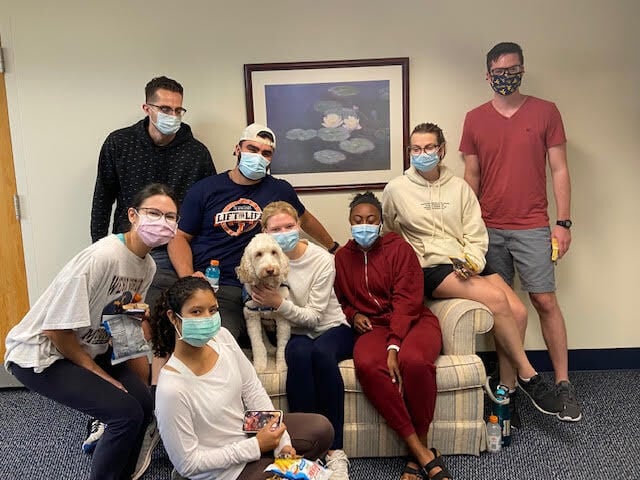
Lucas, official visitation therapy dog of WVU's Health Sciences Center poses for a photo with students.
Photo courtesy Kimberley Helmick
Hearts of Gold an organization that has helped veterans with PTSD gain service dogs, is also aiding in helping students get training related to service dogs.
Lindsay Livengood, a visiting professor who has extensive educational as well as pet training experience, has stated that Hearts of Gold has two main goals.
"One is to educate students on service dogs and other assistance animals, along with how to train them. Two, to place service dogs with veterans with disabilities, mobility impairments and/or psychiatric disabilities. So, a lot of veterans with PTSD end up getting a dog from us," said Livengood.
Livengood has been sought out, due to her background, by the National Institute for Occupational Safety and Health to work on Project ROVER researching the specific needs veterans with PTSD have that can be met with service dog help.
"We have several courses offered by WVU that students can take to learn how to train animals, and they learn about emotional support animals and therapy animals and the laws surrounding all different types of assistance animals," explained Livengood. "We also have a prison program in FCI Morgantown where the inmates there get similar training to what WVU students do. And they also work with and train our dogs to be service dogs for veterans."
For students looking to get involved with such an important group, iServe may not be the place to go.
"Yeah, we do have an iServe account," said Livengood. "But we honestly don't use it a lot, because our biggest need is for people to help with training the dogs. We don't let people handle our dogs unless they're certified through us. So, really the only mechanism to get certified through us is to go through the WVU classes 276 and 277."
These classes are AVS 276 Service Dog Training which is an online class that addresses the "content about service animals, what they are, what they do, how they're trained, healthcare development, sensation and perceptions of dogs," said Livengood.
AVS 277 Service Dog Laboratory then allows students who have finished AVS 276 to work on learning how to train a service dog, hands on. These are offered through the Davis College of Animal and Veterinary Sciences.
Livengood wants to make it clear that students do not need a dog or to house a dog to participate in ABS 276 or 277, "the online course you don't do anything with dogs yet. Then for the hands-on lab we provide the dog for you, and it is housed elsewhere. So, students might have to transport them, like in their vehicles, to and from class. They don't have to house them."
Completing both classes certifies students to work with dogs at Hearts of Gold.
"Once certified you can volunteer with us, helping us take dogs out into public, getting them socialized, training. You can also be a teaching assistant or do like a 490 independent study with me, helping us with the program that way too. But you have to be certified first," said Livengood.
"It's super important to remember the impact service dogs are having and we always try, before our classes, to impart on the students like the importance of the work they're doing," said Livengood, "We have testimonials from some of our veteran clients, that you know basically tell us we've saved their life, or the dog has saved their life."

Students train dogs to serve veterans through Hearts of Gold program
Hearts of Gold an organization that has helped veterans with PTSD gain service dogs, is also aiding in helping students get training related to service dogs.









